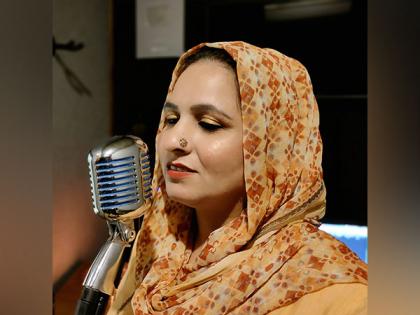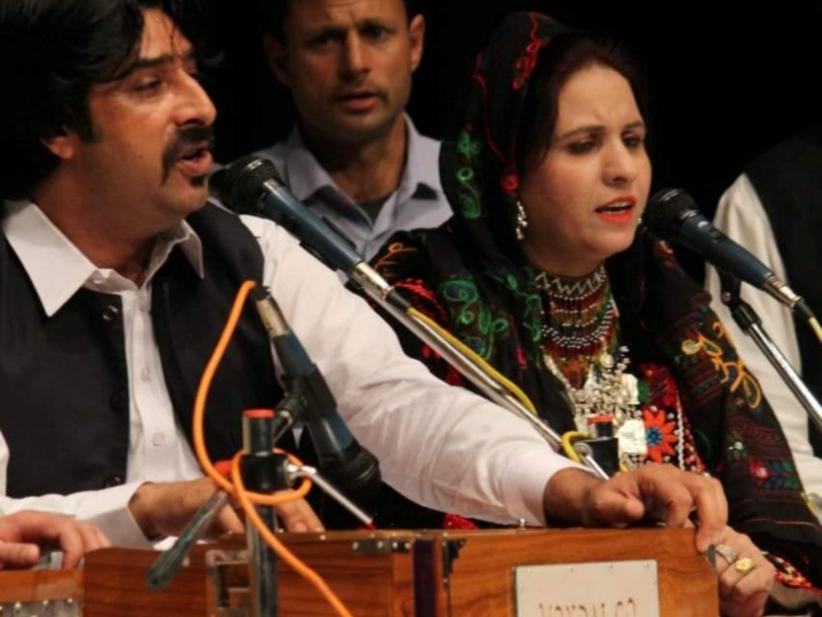Unifying Melodies: Masrat Naz's remarkable influence on Pahari cultural revival in Jammu-Kashmir
By ANI | Published: June 13, 2023 03:47 PM2023-06-13T15:47:11+5:302023-06-13T15:50:03+5:30
Srinagar (Jammu and Kashmir) [India], June 13 : In a world where boundaries often divide, Masrat Naz, the captivating ...

Unifying Melodies: Masrat Naz's remarkable influence on Pahari cultural revival in Jammu-Kashmir
Srinagar (Jammu and Kashmir) [India], June 13 : In a world where boundaries often divide, Masrat Naz, the captivating voice from the Pahari ethnic group of Jammu and Kashmir, has emerged as a beacon of unity and cultural revival.
With her enchanting melodies, this social media sensation has connected people across borders, melting hearts, and fostering a sense of togetherness that knows no boundaries.
Born and raised in Azadpora Boniyar, Baramulla, Masrat Naz's musical journey began under the influence of her father, Noor Ali Sheikh, an esteemed artist of radio and television. His sweet voice became the source of inspiration that kindled Masrat's profound love for music, setting her on a path of dedication and artistic exploration.
From a tender age, Masrat Naz showcased her immense talent, captivating audiences with solo performances that left an indelible mark.
Her unforgettable performance at Girls Higher Secondary School in Boniyar not only resonated with her peers but also propelled her to join the school's singing club, where she honed her skills and nurtured her confidence.
Over time, Masrat Naz's dedication to music propelled her into the limelight, earning her recognition at prestigious institutions such as All India Radio Srinagar, Doordarshan Kashmir, and the Jammu and Kashmir Academy of Art, Culture, and Languages. Through her soul-stirring stage performances and impactful albums, she garnered widespread acclaim, contributing to the revival of the endangered Pahari language.
"Music is a universal language that transcends barriers and connects people, even those who are strangers to one another," Masrat firmly believes. Her influence has traversed the borders of the Kashmir Valley, resonating on both sides of the Line of Control (LoC).
Masrat Naz's journey not only encompasses her own success but also highlights the musical legacy within her family. She was married in the picturesque Karna Kupwara area of north Kashmir to none other than Sayed Tariq Pardesi, a prominent Pahari singer in his own right. The union of these two musical talents further solidifies their commitment to preserving and promoting the rich cultural heritage of Kashmir.
Masrat Naz's family tree is adorned with other accomplished musicians as well. Among them is Syed Kabul Bukhari, the brother of her husband, who has also garnered a reputable name and fame in the music scene of the Valley. This lineage of musical talent underscores the deep-rooted passion and dedication to music that flows through their veins.
With their combined talents and shared love for the Pahari language, Masrat Naz and Sayed Tariq Pardesi stand as a formidable forces in the realm of music, captivating audiences and enriching the cultural fabric of Kashmir. Their harmonious partnership is a testament to the power of music to bring people together and preserve the traditions that define a community.
Currently residing in Mumbai, Masrat Naz has become a force to be reckoned with, emphasizing the transformative power of music to unite hearts and transcend boundaries. Her magnetic performances have graced various corners of India, including Tamil Nadu, Maharashtra, Himachal Pradesh, New Delhi, Hyderabad, and Punjab, spreading her popularity across the nation like wildfire.
True to her artistic spirit, Masrat Naz's repertoire extends beyond language barriers, encompassing songs in multiple languages such as Kashmiri, Gojri, Urdu, Punjabi, Dogri, and Pahari. Her versatility as an artist shines through as she fearlessly explores diverse genres, ranging from the enchanting tunes of Pahari Folk to the mesmerizing melodies of Urdu Gazals, Qawali, Punjabi, Gojri, and Kashmiri songs.
Not only has Masrat Naz's talent been acknowledged in her homeland, but it has also garnered tremendous appreciation across the border in Pakistan. Her performances in cities like Karachi, Lahore, Islamabad, Neelam Valley, and Muzaffarabad have left audiences in awe, with thunderous applause accompanying her every note.
For Masrat Naz, music is more than mere entertainment, it is a language that speaks directly to the soul.
She believes that music has the remarkable power to evoke calmness during stressful times and unleash suppressed emotions, acting as a bridge between cultural heritages and erasing borders that separate humanity.
"Music is a means of self-expression that can touch the hearts of people worldwide," Masrat emphasized.
Her unwavering dedication to her craft and her commitment to preserving and reviving the cultural heritage of Kashmir have made her a role model for many.
Zubair Qureshi, the renowned Pahari writer and journalist expressed his delight at the rise of talented singers like Masrat Naz, who actively promote the Pahari language and culture.
"I am delighted to see talented singers like Masrat Naz promoting our Pahari language and culture. She is preserving the rich cultural heritage of Kashmir through her melodious voice," he said.
Zubair acknowledged the significant role Masrat plays in preserving the rich cultural heritage of Kashmir through her melodious voice and how she has become a symbol of unity and pride for the region.
Masrat Naz continues to mesmerize listeners with her enchanting voice, and Sayed Tariq Pardesi shines with his own musical prowess.
Their collective contributions to the music industry in Kashmir are sure to leave a lasting legacy, inspiring future generations to carry the torch of cultural preservation and artistic expression. Together, they demonstrate the enduring power of music to transcend boundaries, ignite unity, and foster a sense of pride in one's heritage.
Disclaimer: This post has been auto-published from an agency feed without any modifications to the text and has not been reviewed by an editor
Open in app